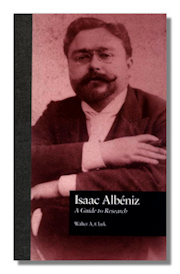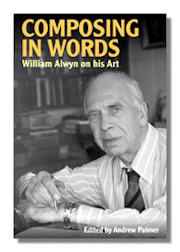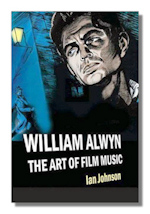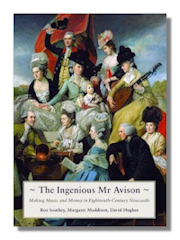Site Search
Follow us on


Affiliates
Books About Music
Biographies

Albéniz |
Albinoni |
Alwyn |
Avison

-
Isaac Albéniz – A Guide to Research Walter A. Clark. Routledge (formerly Garland Press). 1998. ISBN 0193152452 (hardcover), 0815320957 (paperback).
-
This book presents the most up-to-date biography of the Spanish composer Isaac Albéniz (1860-1909) and is the first to offer a thorough, annotated bibliography in addition to an extensive discography, chronology, and list of works. The bibliography treats not only articles, books, dissertations, and exhibition publications, but also includes numerous reviews of his operas and other works. An overview of the nature and location of primary sources and the holdings of various archives (in England, France, Belgium, Germany, and Spain) is an especially useful feature of this book that is not available anywhere else. Albéniz's letters, manuscripts, library, photographs, and other important documents and personal effects are discussed. This guide to research sheds welcome light on one of the most important composers in the history of Spanish music, one whose works won the admiration of Fauré, Debussy, and Messiaen, and exerted a profound influence on de Falla, Turina, and Rodrigo.
-
Tomaso Albinoni: The Venetian Composer and His World. Michael Talbot. Oxford University Press. 1994. ISBN 0198164203 (paperback).
-
Michael Talbot looks in detail at Albinoni's output, and, placing the composer in his historical context, argues for a general re-appraisal of his achievement. He provides a detailed review of Albinoni's works according to chronology and genre and includes a discussion of several newly discovered works. Alongside this review is a penetrating analysis of Albinoni's musical style in general, resulting from many years of familiarity with the music. Talbot also presents new information about Albinoni's unusual life and many interesting details of Venetian background, showing how this very distinctive social and cultural environment left its mark on the composer. Also included is a complete catalogue of Albinoni's works, and a guide to modern editions.
William Alwyn

-
Composing in Words (Musicians on Music). William Alwyn (Author), Andrew Palmer (Editor). Toccata Press. 2009. ISBN 090768971X (hardcover).
-
The English composer William Alwyn was not only one of the most versatile creative figures of his age, writing music for the concert hall, recital room, operatic stage and film screen; he was also a virtuoso instrumentalist and conductor, the teacher of some of the most important composers of the succeeding generation, and the founder of a number of influential music committees such as the Composers' Guild of Great Britain. Alwyn was a gifted writer, too, alive to literature and art – especially pre-Raphaelite painting, on which he was an authority – as well as to music, and Composing in Words presents his most important writings: the autobiographical essay Winged Chariot; the diary, Ariel to Miranda, in which he chronicled the composition of his Third Symphony; an extract from Early Closing, Alwyn's reminiscences of his Northampton childhood; and essays on film music, and on other composers, among them Elgar, Bax and Puccini.

-
William Alwyn: The Art of Film Music. Ian Johnson. Oxford University Press. 2005. ISBN 1843831597 (hardcover).
-
William Alwyn's good fortune was to join the British film industry near the close of the 1930s, just before it ripened in the hothouse of the Second World War. He became one of Britain's most prolific composers for the screen: many of his 70 features are acknowledged classics, among them Desert Victory, Odd Man Out, The History of Mr Polly and The Fallen Idol. He was his own man, a Romantic, with little time for atonality or serialism which he considered a barrier to his communication with the public. He devised his own alternative to twelve-tone serialism and used it in his Third Symphony (1955-6) and his score for The Black Tent (1956). Dissonance was a different matter, and he relished it for scenes of threat, peril, nightmare or terror, or simply to produce a tension as it 'pulls' towards a consonant resolution. After the war, Alwyn's reputation was high as both a film and concert composer. Alone with Vaughan Williams he was granted the distinction of a separate title credit; columnists mentioned him alongside Bliss, Bax and Walton. As the reputation of the British film industry declined in the 1950s, so musical snobbery against those who were its leading lights became unpleasantly raw. In recent years, however, with sensitive performances of his film and concert music available on CD, this most appealing of composers has enjoyed something of a renaissance. Ian Johnson's evaluation of Alwyn's film music places his achievement in the context of wider movements within the film industry. Detailed film- and discographies will prove invaluable for enthusiasts of British music of the 20th century and the history of the British film industry.
Charles Avison
-
The Ingenious Mr. Avison: Making Music and Money in Eighteenth Century Newcastle. Roz Southey, Margaret Maddison, David Hughes. Tyne Bridge Publishing. 2009. ISBN 1857951298 (hardcover).
-
Charles Avison (1709-1770) was a remarkable Tyneside musician who became England's most important 18th-century concerto composer. Now the first full-length biography tells the talented composer's story, and how, through enterprise and determination, he made Newcastle-upon-Tyne England's greatest provincial music center of the time. This book explores a world of fashionable concerts, money-making, rivalry, wigs, waistcoats, dancing, love affairs, and family tragedy. This well-researched survey also includes details of Avison's published works, a discography, and extensive notes. It is essential reading for students of English music and an informative and entertaining window onto provincial musical life in the 18th century.



















